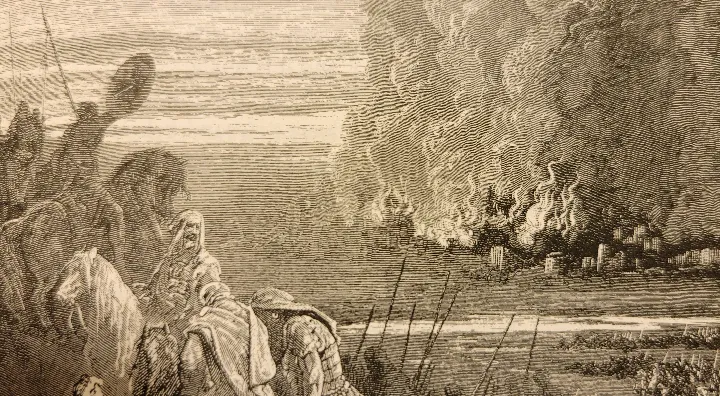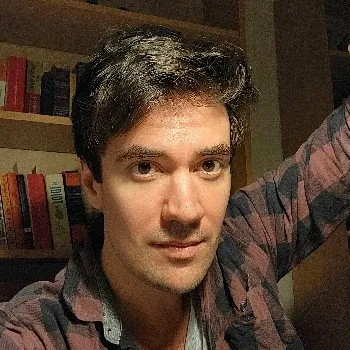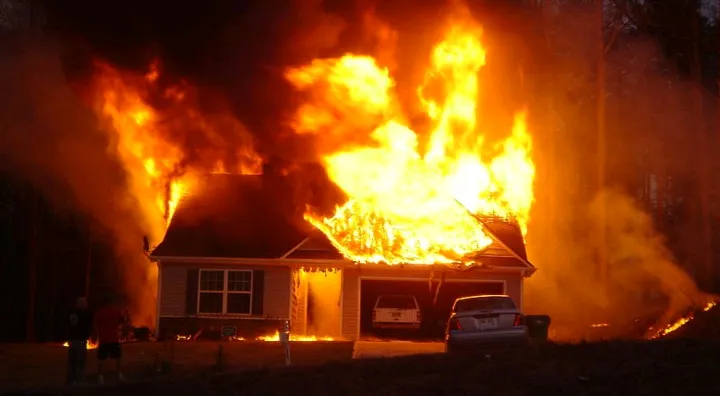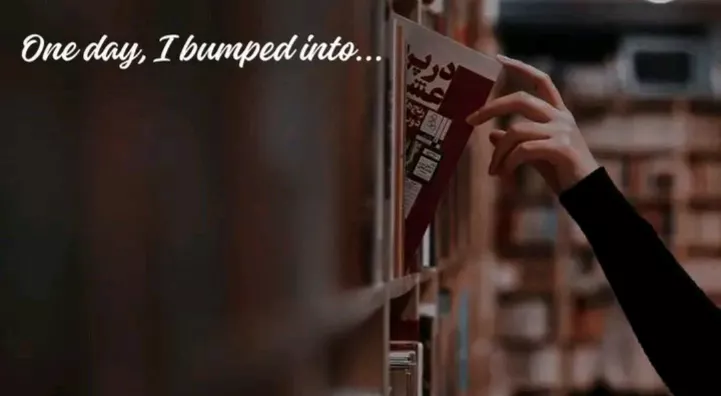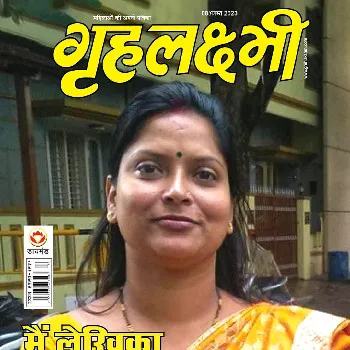Heavenly Kingdoms - Chapter 7
From Margaret Playford to Caroline Playford, 16th of July, 1859.
Dear Caroline,
I hope you have received my last letter, as I will not be summarizing the content for context and will immediately begin my tale regarding Mr Charlston’s choleric distemper and the nightmare he presents to one who only wishes to care for him – like a dog in pain that lashes out to hands that wish to only express love. That evening at supper I found out where the old man had been sequestered away to by the piercing cry that sundered the peace and almost made me upend the table in fright. At first I forgot myself and thought it a wild beast roaming the house, and, perhaps as proof of a hidden bravery, found myself standing with a dinner knife in hand ready for some sort of martial combat.
It was then seeing that Anne was entirely unsurprised, exuding rather a resigned despair, that I knew the form of the beast that the cry had issued from. Mrs Cruikshank moved to leave the room but Anne motioned for her to stop, and evidently signaling without words, in a common language she and the servant share, that she would go herself. I for one was not about to let Anne go into the lair of the beast alone and insisted that I tag along, her initial dislike of this idea worn down by my truculence after much back and forth that I won’t trouble you with.
As we left the room and made down the hall, Anne, now no longer feeling it necessary to hide any details, explained to me how her father had been coaxed away from the fire and into Mrs Charlston’s old chamber. She had simply gone into her mother’s room and called her father’s name in as close a parody of her mother’s voice as she could muster, just loud enough for the old man to hear. Mr Charlston had heard; and, like a sleep walker, staggered down the hall, whimpering his lost wife’s name in an agony of hope - Anne leaving by a side door into an adjoining chamber before he arrived. There he had remained.
As to what he did upon finding the room empty and why he stayed knowing it did not contain the object of his desire, one could only guess. Perhaps he felt that the voice had come from her passing ghost, and should he remain among her possessions, she would admire his loyalty to her memory and return. Glancing into the room sometime later, Anne had seen him lying curled on the bed, sobbing almost silently.
I must admit, Caroline, that, having known the Charlstons all my life, I never did suspect the intensity of passion that Mr Charlston had for his wife. He was even quite brusque with her at times, and yet the radiance and warmth of Mrs Charlston makes me now surmise that her husband was indeed deeply in love and even affectionate with her but rather held his love in when others were present and then gave it all to her when they were alone. How else could such a woman be happy with such a disagreeable man? Perhaps by holding his love too tightly it curdled all the more severely when he had not the object of his love near to express it and no other to share his grief since none other truly knew the depth of his loss. Such a sad, lonely business. You know I love my silly George, but I can’t imagine a love such as this. It seems infernal rather than divine. Mr Charlston might have lived a perfectly content life to one hundred and three as a bachelor but now he seems rather unlikely to reach sixty since love so rabidly infects his heart. One wonders what is the point of it all?
As I said last time, please forgive these momentary lapses in my usual demeanor; the air here is heavy with the death of spirit and I cannot help being overcome at times.
Back to my narrative, but please Caroline, hold your nerve for what is to come and know that we all came out of it without serious harm. We entered Mrs Charleston’s old chamber to find the disheveled old man with his palms against the window staring at something, eyes aghast with horror. Blood was splattered across the glass. After understandable moments of shock, Anne rushed over to the window to see if her father was injured. Once she had reached the window and looked upon the scene up close, she called back to me, “It’s only a bird. Poor thing. It has… expired.”
When uttering this last word, a glaze ran over Anne’s eyes and her voice dropped all emotion. So clinical was her choice of word, I wondered if my jest about her being a doctor was beginning to manifest within her – alas, I lie to lighten the tone of this letter. In reality I was chilled to see the two of them, father and daughter transfixed by the sight, one in the grip of horror, the other: ice.
After a moments solemnity in which two humans seemed to be in mourning for a lost avian, Anne said, “It’s just a dead bird father.”
“Dead?” he whispered hoarsely, “No, nothing is dead. I see it beating down there - its blood cries to me. Its wings are as fresh as the moment they fluttered from its egg. You cannot speak of the dead. You have no right. Rain will come and touch its feathers. That is not death. You should not lie to me. Not here. Does a song die after being sung? Do patterns change after the seer tires of them? Death is a fancy. A stammered wish to be free of pain, yet pain cannot be so easily discarded. It ever lingers; seeps into the wood to taint the ages. All is built from pain. There is no escape; there is no end. You choose life yet a thousand lives suffer for it. You choose love and wither the branches of a thousand trees. To die, oh to die! If such were possible, I would embrace its cooling grip and cease the wailing of Earth’s torment. Can you hear it? Groaning, weeping; rock in stressed agony, trees in perpetual rigor, a thousand critters bleeding, dashing their heads upon a surface invisible; never knowing why, never seeing truly. Nothing can be done, least of all die.”
Caroline, I have heard some mortifying things in my life but I think nothing has so shaken me with its bleakness than this epistle. Worst of all, Anne seemed to offer no contradiction, saying rather, “All is as God intends.”
“Yes,” said Mr Charlston in a moment of reverie, short-lived, for a moment later he whirled on Anne and took hold of her, shouting, “It was you, devil! Your voice led me here! For what? To break the broken? No more can be done on that account, least of all by a black-hearted harlot! Once a daughter, fie!”
His grip tightened, crushing Anne, causing her to cry out. I came forward to try and help my dear friend but before I could reach them the old man noticed me for the first time since I entered the room and instantly released his daughter.
“Helen?” he said.
I froze, momentarily unable to comprehend.
“Helen?” he said again, and moved slowly toward me.
Anne, who had fallen to the floor, viewed the scene in disbelief, and for once found words where they failed me, “Father, that’s Maggie. For god’s sake!”
But Mr Charlston had only eyes and ears for me, continuing to step forward until I recovered my senses and began to step back toward the door. I was not able to escape. He overtook and embraced me from behind, his fetid breath staining the air, saying again and again, “Oh Helen!”
I protested yet my words had no effect on his blinkered mind, so absorbed was he in his apparent union with his long lost beloved.
“Release her, father,” I heard Anne say coldly, yet could not see her as I was held facing the door.
After a moment, during which my captor ignored his daughter’s entreaties, I felt a jolt from behind and the release of Mr Charlston’s grip as he sunk to the floor. I turned, bewildered, to see Anne holding a small marble statue; the apparent weapon of my salvation.
“Please leave,” she said, breathing heavily, “go Maggie. I’ll tend to him.”
I did as ordered, passing Mrs Cruikshank in the hall who had come to see the cause of commotion. Somewhat in a daze I returned to the dining room to sit alone and think over what had just passed. I am no dead ringer for Mrs Charlston; I can only boast some of her features and characteristics. But I suppose that is enough for a mind capable of conjuring anything to end its suffering. It did not augur well for my stay to have established such resemblance.
I should have left Sedgewood after this incident but, fool that I am, I was obliged to stay and fulfill the commitment to my friend. I will relate more of what has passed but can say no more today dear cousin. I will write you again tomorrow.
Maggie
Dear Caroline,
I hope you have received my last letter, as I will not be summarizing the content for context and will immediately begin my tale regarding Mr Charlston’s choleric distemper and the nightmare he presents to one who only wishes to care for him – like a dog in pain that lashes out to hands that wish to only express love. That evening at supper I found out where the old man had been sequestered away to by the piercing cry that sundered the peace and almost made me upend the table in fright. At first I forgot myself and thought it a wild beast roaming the house, and, perhaps as proof of a hidden bravery, found myself standing with a dinner knife in hand ready for some sort of martial combat.
It was then seeing that Anne was entirely unsurprised, exuding rather a resigned despair, that I knew the form of the beast that the cry had issued from. Mrs Cruikshank moved to leave the room but Anne motioned for her to stop, and evidently signaling without words, in a common language she and the servant share, that she would go herself. I for one was not about to let Anne go into the lair of the beast alone and insisted that I tag along, her initial dislike of this idea worn down by my truculence after much back and forth that I won’t trouble you with.
As we left the room and made down the hall, Anne, now no longer feeling it necessary to hide any details, explained to me how her father had been coaxed away from the fire and into Mrs Charlston’s old chamber. She had simply gone into her mother’s room and called her father’s name in as close a parody of her mother’s voice as she could muster, just loud enough for the old man to hear. Mr Charlston had heard; and, like a sleep walker, staggered down the hall, whimpering his lost wife’s name in an agony of hope - Anne leaving by a side door into an adjoining chamber before he arrived. There he had remained.
As to what he did upon finding the room empty and why he stayed knowing it did not contain the object of his desire, one could only guess. Perhaps he felt that the voice had come from her passing ghost, and should he remain among her possessions, she would admire his loyalty to her memory and return. Glancing into the room sometime later, Anne had seen him lying curled on the bed, sobbing almost silently.
I must admit, Caroline, that, having known the Charlstons all my life, I never did suspect the intensity of passion that Mr Charlston had for his wife. He was even quite brusque with her at times, and yet the radiance and warmth of Mrs Charlston makes me now surmise that her husband was indeed deeply in love and even affectionate with her but rather held his love in when others were present and then gave it all to her when they were alone. How else could such a woman be happy with such a disagreeable man? Perhaps by holding his love too tightly it curdled all the more severely when he had not the object of his love near to express it and no other to share his grief since none other truly knew the depth of his loss. Such a sad, lonely business. You know I love my silly George, but I can’t imagine a love such as this. It seems infernal rather than divine. Mr Charlston might have lived a perfectly content life to one hundred and three as a bachelor but now he seems rather unlikely to reach sixty since love so rabidly infects his heart. One wonders what is the point of it all?
As I said last time, please forgive these momentary lapses in my usual demeanor; the air here is heavy with the death of spirit and I cannot help being overcome at times.
Back to my narrative, but please Caroline, hold your nerve for what is to come and know that we all came out of it without serious harm. We entered Mrs Charleston’s old chamber to find the disheveled old man with his palms against the window staring at something, eyes aghast with horror. Blood was splattered across the glass. After understandable moments of shock, Anne rushed over to the window to see if her father was injured. Once she had reached the window and looked upon the scene up close, she called back to me, “It’s only a bird. Poor thing. It has… expired.”
When uttering this last word, a glaze ran over Anne’s eyes and her voice dropped all emotion. So clinical was her choice of word, I wondered if my jest about her being a doctor was beginning to manifest within her – alas, I lie to lighten the tone of this letter. In reality I was chilled to see the two of them, father and daughter transfixed by the sight, one in the grip of horror, the other: ice.
After a moments solemnity in which two humans seemed to be in mourning for a lost avian, Anne said, “It’s just a dead bird father.”
“Dead?” he whispered hoarsely, “No, nothing is dead. I see it beating down there - its blood cries to me. Its wings are as fresh as the moment they fluttered from its egg. You cannot speak of the dead. You have no right. Rain will come and touch its feathers. That is not death. You should not lie to me. Not here. Does a song die after being sung? Do patterns change after the seer tires of them? Death is a fancy. A stammered wish to be free of pain, yet pain cannot be so easily discarded. It ever lingers; seeps into the wood to taint the ages. All is built from pain. There is no escape; there is no end. You choose life yet a thousand lives suffer for it. You choose love and wither the branches of a thousand trees. To die, oh to die! If such were possible, I would embrace its cooling grip and cease the wailing of Earth’s torment. Can you hear it? Groaning, weeping; rock in stressed agony, trees in perpetual rigor, a thousand critters bleeding, dashing their heads upon a surface invisible; never knowing why, never seeing truly. Nothing can be done, least of all die.”
Caroline, I have heard some mortifying things in my life but I think nothing has so shaken me with its bleakness than this epistle. Worst of all, Anne seemed to offer no contradiction, saying rather, “All is as God intends.”
“Yes,” said Mr Charlston in a moment of reverie, short-lived, for a moment later he whirled on Anne and took hold of her, shouting, “It was you, devil! Your voice led me here! For what? To break the broken? No more can be done on that account, least of all by a black-hearted harlot! Once a daughter, fie!”
His grip tightened, crushing Anne, causing her to cry out. I came forward to try and help my dear friend but before I could reach them the old man noticed me for the first time since I entered the room and instantly released his daughter.
“Helen?” he said.
I froze, momentarily unable to comprehend.
“Helen?” he said again, and moved slowly toward me.
Anne, who had fallen to the floor, viewed the scene in disbelief, and for once found words where they failed me, “Father, that’s Maggie. For god’s sake!”
But Mr Charlston had only eyes and ears for me, continuing to step forward until I recovered my senses and began to step back toward the door. I was not able to escape. He overtook and embraced me from behind, his fetid breath staining the air, saying again and again, “Oh Helen!”
I protested yet my words had no effect on his blinkered mind, so absorbed was he in his apparent union with his long lost beloved.
“Release her, father,” I heard Anne say coldly, yet could not see her as I was held facing the door.
After a moment, during which my captor ignored his daughter’s entreaties, I felt a jolt from behind and the release of Mr Charlston’s grip as he sunk to the floor. I turned, bewildered, to see Anne holding a small marble statue; the apparent weapon of my salvation.
“Please leave,” she said, breathing heavily, “go Maggie. I’ll tend to him.”
I did as ordered, passing Mrs Cruikshank in the hall who had come to see the cause of commotion. Somewhat in a daze I returned to the dining room to sit alone and think over what had just passed. I am no dead ringer for Mrs Charlston; I can only boast some of her features and characteristics. But I suppose that is enough for a mind capable of conjuring anything to end its suffering. It did not augur well for my stay to have established such resemblance.
I should have left Sedgewood after this incident but, fool that I am, I was obliged to stay and fulfill the commitment to my friend. I will relate more of what has passed but can say no more today dear cousin. I will write you again tomorrow.
Maggie
Related Stories
